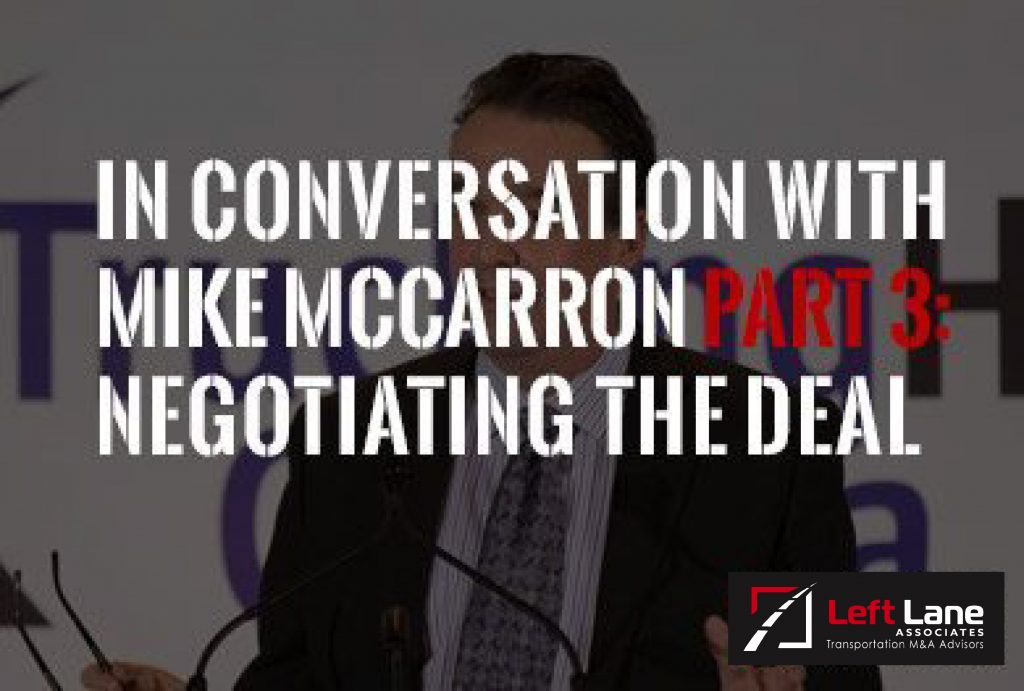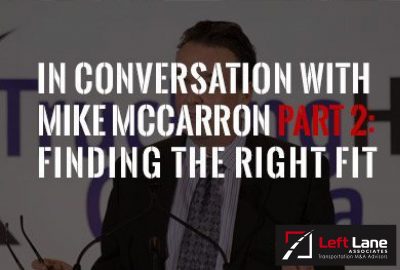M&A - Buy, M&A - Sell
In Conversation with Mike McCarron Part 3: Negotiating the Deal
MISSISSAUGA, Ont. – On October 16th, Mike McCarron, the well-known former owner of MSM Transportation will team up with M&A guru Doug Nix for the much anticipated session “Mergers & Acquisitions in Transportation: How big are the opportunities?” at our Surface Transportation Summit.
The session, moderated by publisher and editorial director Lou Smyrlis, will provide insights for both potential buyers and sellers.
About a year ago, in a move that caught the industry by surprise, McCarron, at the age of 52 and in the midst of considerable business success, sold MSM Transportation to Wheels Group for $18.6 million. Executive editor James Menzies caught up with him shortly after for an exclusive story that revealed the reason for the sale, the significance behind its timing, and what he learned along the way. To prepare you for the M&A session at our Surface Transportation Summit, we are re-running the 7-part interview.
To find out more and register for the Surface Transportation Summit click here: www.surfacetransportationsummit.com.
In the meantime, enjoy Part 3
Part 3: Negotiating the Deal
TN: So, once you identified Wheels as a strategic fit, what came next? Did you sit down in a boardroom like this one and hammer out a deal?
McCarron: The first thing we did was hired an investment banker, who helped us maximize the value. They can be very expensive, but I like an investment banker almost as an agent for a hockey player. People say ‘Why does a hockey player need an agent?’
The problem with negotiations is they can get difficult, and they can get personal. You have to be very careful because when it does get personal, if you are involved in the negotiations you can sometimes take it too personally and set the negotiations off. We felt that working with an investment banker, their experience was great, they helped us work through the legal jargon – in particular dealing with a public company – and they really helped us get to the finish line.
TN: Were you completely hands-off during the early stages of negotiations, allowing your investment banker to represent you as a hockey agent would, or were you involved at every step along the way?
McCarron: There was a ton of direct contact because when you’re talking to a public company, there is a fiduciary responsibility that no stone can go unturned. When no stone goes unturned, there are a lot of questions, questions we didn’t always have the answers to, at least initially. It’s a really complicated process.
What people don’t understand is that the due diligence isn’t only on the side of the acquirer. We did a lot of due diligence to determine if it was the right fit for us. Part of the deal was stock, so we had to make sure the paper we’re getting is good paper.
The part I think everyone forgets, James, is that while this is going on, you still have to protect your bottom line. As much as we began discussions in January of last year and closed in October, the closing is based on the numbers at that time. So, now you have your financial team and your administrative team doing reports, answering questions and going to meetings, but they still need to be managing the house. People tend to forget about that. The day someone knocks on your door is not the day you sell the business. It’s based on your financial statements, so every time you have a bad month – or conversely, a good month – it’s affecting the numbers. The numbers are based on the snapshot that day, but they take a brand new snapshot the day they close the deal.
– In Part 4 of this interview, McCarron reveals the biggest surprise in selling his business and how the companies involved managed to keep it quiet.
Comments are closed


